Correlation and path coefficient analysis of yield and yield associated traits in small onion
Bạn đang xem bản rút gọn của tài liệu. Xem và tải ngay bản đầy đủ của tài liệu tại đây (321.28 KB, 8 trang )
Int.J.Curr.Microbiol.App.Sci (2018) 7(7): 3065-3072
International Journal of Current Microbiology and Applied Sciences
ISSN: 2319-7706 Volume 7 Number 07 (2018)
Journal homepage:
Original Research Article
/>
Correlation and Path Coefficient Analysis of Yield and Yield
Associated Traits in Small Onion
M. Visalakshi1*, C. Porpavai2 and M. Pandiyan1
1
AC & RI, Eachangkottai, Tamil Nadu Agricultural University, Thanjavur, Tamil Nadu, India
2
SWMRI, TNAU, Kattuthottam, Thanjavur, Tamil Nadu, India
*Corresponding author
ABSTRACT
Keywords
Small onion,
Phenotypic and
genotypic
correlation, Path
coefficient
Article Info
Accepted:
24 June 2018
Available Online:
10 July 2018
Genotypes of small onion were evaluated during 2014-2016 to determine the genotypic
and phenotypic correlation along with their direct and indirect effects for bulb yield
through path coefficient analysis in small onion. The experiment was conducted in a
randomized block design (RBD) in two seasons with three replications at Soil and Water
Management Research Institute, Kattuthottam, Thanjavur. The experiment result revealed
that in most of the cases the genotypic correlation is higher than the corresponding
phenotypic correlation values. This suggests that there inherit a strong relationship
between the characters. In the present study, during summer season the bulb yield per
hectare was positively and significantly associated with plant height at bulb formation
stage (0.903), number of leaves at vegetative stage (0.813), neck thickness (0.886), neck
diameter (0.868), equatorial diameter of bulb (0.91) and bulb weight (846). Higher number
of leaves at vegetative stage is positively correlated and significant at polar diameter and
equatorial diameter of bulb. Yield associating characters like neck thickness, neck
diameter and polar diameter were also highly significant and positively correlated. During
Kuruvai season, Bulb yield per hectare is highly significant and positively correlated with
plant height at bulb formation stage (0.926) followed by bulb weight (0.96), neck thickness
(0.889), equatorial diameter of bulb (0.873), polar diameter of bulb (0.852) and number of
leaves at vegetative stage (0.834). Neck thickness expressed a highly significant and
positive correlation co-efficient with polar and equatorial diameter & bulb weight. Polar
and diameter is interrelated and positively correlated with equatorial diameter and bulb
weight. Path coefficient of different characters contributing towards bulb yield during
summer and kuruvai season bulb weight had the positive direct effect followed by
equatorial diameter of the bulb, neck thickness, plant height at bulb formation stage and
bulb filled stage and number of leaves at bulb formations stage. The improvement in
marketable bulb yield per plant will be efficient, if the selection is based on bulb weight,
neck thickness, plant height at bulb filled and bulb formation stage, polar diameter and
equatorial diameter of bulb.
3065
Int.J.Curr.Microbiol.App.Sci (2018) 7(7): 3065-3072
Introduction
Onion is an important bulb crop belongs to the
family Alliaceae. It is grown for food,
religious purpose, spices and condiments since
early times. Bulb yield in onion is a complex
character controlled by many factors. In order
to evaluate the promising genotypes with high
yield it is essential to know the associations
among different traits especially with bulb
yield. Therefore selection for desirable
genotypes should be based on bulb yield and
also other yield attributes which influences the
yield. The correlation and path analysis are
usually taken up to measure the relative
magnitude and direction of each independent
variable on a dependent variable like bulb
yield. Som Pal Baliyan (2014) evaluated for
six varieties of onion adaptability to the
climatic conditions in Botswana. Crops
performs in a different way under varied
climatic conditions and varieties of same
species cultivated in the same environments
gives different yields as the potential of the
crop depends on the interaction of genetic
makeup and environment (Jilani and Ghafoor,
2003; Kimani et al., 1993). The present
investigation was therefore planned to
estimate the extent of association among yield
and yield attributes in small onion types for 11
characters in the Cauvery Delta Region.
Materials and Methods
The present investigation on correlation and
path analysis in diverse onion was conducted
at Soil and Water Management Research
Institute, Kattuthottam, Thanjavur during 2014
- 2016. The experiment materials of the
present investigation was comprised of seven
genotypes of small onion viz., Co 4, CO(On)5,
Arka Bindu, Agri Found Rose, Perambalur
Local, Cuddalore Local and Ottanchatram
Local and experiment is conducted in
Randomized Block Design with three
replications to estimate the genetic variability,
association and path analysis. Observations
were recorded on the basis of five random
competitive plants selected from each
genotype separately for quantitative and
qualitative parameters were evaluated as per
the standard procedure. The main objectives
were to estimate the genetic variability,
correlation and path co-efficient analysis
between yield and its attributing characters to
identify better performing genotypes in small
onion. The correlation co-efficient were
calculated in all possible combinations taking
all the characters into consideration at
genotypic, phenotypic and environmental
levels. The mean values of plants were utilized
for estimation of genotypic correlation coefficient as per the method suggested by
Johnson et al., (1955) whereas path coefficient
analysis was worked out by the methods used
by Dewey and Lu (1959) to find out the
relationship between yield and yield attributes.
Results and Discussion
Correlation coefficient analysis
The genotypic correlation coefficients were
higher as compared to phenotypic correlation
coefficient in most of the cases (Table 1). This
indicates greater contribution of genotypic
factor in the development of the character
associations. The findings are in agreement to
Raghuwanshi et al., (2016) and Hosamani et
al., (2010). In the present study, during
summer season the bulb yield per hectare was
positively and significantly associated with
plant height at bulb formation stage (0.903),
number of leaves at vegetative stage (0.813),
neck thickness (0.886), neck diameter (0.868),
equatorial diameter of bulb (0.91) and bulb
weight (846). The phenotypic value is
lessened by the significant environment
interaction. During kuruvai season, the
magnitude of genotypic correlation was higher
than the phenotypic correlation for most of the
traits that indicated inherent association
3066
Int.J.Curr.Microbiol.App.Sci (2018) 7(7): 3065-3072
between various characters (Table 2). Bulb
yield per hectare recorded is highly significant
and positive correlation with plant height at
bulb formation stage (0.926) followed by bulb
weight (0.96), neck thickness (0.889),
equatorial diameter of bulb (0.873), polar
diameter of bulb (0.852) and number of leaves
at vegetative stage (0.834) indicating that
these characters are the primary yield
determinants in onion and can be improved
through direct selection. These findings
corroborate the earlier findings of Hosamani et
al., (2010); Dhotre et al., (2010); Awale et al.,
(2011); Saini and Maurya (2014) for
equatorial diameter; Awale et al., (2011) and
Saini and Maurya (2014) for polar diameter;
Dhotre et al., (2010), Awale et al., (2011);
Saini and Maurya (2014) for neck thickness;
Hayder et al., (2007) and Saini and Maurya
(2014) for plant height.
correlation co-efficient with polar and
equatorial diameter and bulb weight. Polar
diameter is interrelated and positively
correlated with equatorial diameter and bulb
weight. The findings are in agreement to
Raghuwanshi et al., (2016); Hosamani et al.,
(2010); Awale et al., (2011); Dhall and Brar
(2013) and Saini and Maurya (2014).
Equatorial diameter of the bulb was negatively
associated with days for harvesting but
positively correlated with bulb weight. The
findings corroborate the earlier findings of
Raghuwanshi et al., (2016); Hosamani et al.,
(2010); Awale et al., (2011) and Saini and
Maurya (2014). This indicates that the
associating parameters like neck thickness,
polar and equatorial diameter, bulb weigh can
be considered during the varietal selection.
While considering the interrelationship among
the bulb yield contributing parameters, plant
height at bulb filled stage is positively
correlated with neck thickness (0.988), neck
diameter (0.983), polar diameter of bulb
(0.812), equatorial diameter of bulb (0.945)
and bulb weight (0.882) and negatively
associated with days for harvesting. Higher
number of leaves at vegetative stage is
positively correlated and significant at polar
diameter and equatorial diameter of bulb.
Yield associating characters like neck
thickness, neck diameter and polar diameter
were also highly significant and positively
correlated. Therefore to improve the bulb
yield in onion the above said associated
characters should be given due consideration
during the selection of genotypes for breeding.
While in kuruvai season, plant height at bulb
formation stage showed significant and
positive correlation with number of leaves at
vegetative and bulb formation stage, neck
thickness, polar and equatorial diameter of the
bulb and weight of the bulb. Neck thickness
expressed a highly significant and positive
Path coefficient of different characters
contributing towards bulb yield during
summer and Kuruvai season revealed that bulb
weight had the positive direct effect followed
by equatorial diameter of the bulb, neck
thickness, plant height at bulb formation stage
and bulb filled stage and number of leaves at
bulb formations stage (Table 3). Days for
harvesting have negative direct effect with the
bulb yield. The parameters such as polar
diameter of the bulb, bulb weight, plant height
at bulb formation and bulb filled stage have
the positive indirect effects towards the yield
contributing characters like bulb yield. The
results are in propinquity with Aliya et al.,
(2007); Dhotre et al., (2010) and Hosamani et
al., (2010) for polar diameter, Sharma et al.,
(2015) for plant height, Barad et al., (2012)
for bulb weight, polar, equatorial and Sharma
et al., (2015) for number of leaves per plant.
Number of leaves, equatorial diameter and
days for harvesting has expressed negative
indirect effects.
Path co-efficient analysis
3067
Int.J.Curr.Microbiol.App.Sci (2018) 7(7): 3065-3072
Table.1 Estimates of genetic and phenotypic correlation coefficient analysis among yield and its contributing traits in small onion
during summer season
Character
1
2
3
4
5
6
7
8
9
10
1
2
3
4
5
6
7
8
9
10
11
P
1
0.661
0.824**
0.896**
0.517
0.567
0.839**
0.765**
-0.812**
0.871**
0.595
G
1
0.7
0.835**
0.899**
0.535
0.589
0.852**
0.785**
-0.312
0.882**
0.562
P
1
0.659
0.557
0.988**
0.983**
0.812**
0.945**
-0.347
0.946**
0.903**
G
1
0.682
0.586
0.962**
0.965**
0.825**
0.945**
0.051
0.947**
0.831**
P
1
0.789**
0.596
0.639
0.842**
0.809**
-0.58
0.793**
0.813**
G
1
0.8**
0.61
0.654
0.852**
0.821**
-0.223
0.806**
0.787**
P
1
0.415
0.459
0.694
0.743**
-0.994**
0.745**
0.562
G
1
0.435
0.482
0.711
0.757**
-0.52
0.759**
0.546
P
1
0.983**
0.736*
0.898**
-0.094
0.867**
0.9**
G
1
0.983**
0.743**
0.896**
0.049
0.866**
0.886**
P
1
0.825**
0.923**
-0.068
0.886**
0.868**
G
1
0.831**
0.923**
0.092
0.888**
0.849**
P
1
0.868**
-0.266
0.894**
0.707
G
1
0.878**
0.012
0.902**
0.679
P
1
-0.516
0.953**
0.91**
G
1
-0.149
0.956**
0.872**
P
1
-0.537
-0.312
G
1
-0.153
-0.223
P
1
0.846**
G
1
0.808**
11
1
6 – Neck diameter
7 – Polar diameter of bulb
8 – Equatorial diameter of bulb
9 – Days for harvesting
10 – Bulb weight
11 – Bulb yield per ha
*, ** - significant at 5 % and 1 % levels respectively
1 – Plant height at bulb formation stage
2 – Plant height at bulb filled stage
3 – Number of leaves at vegetative stage
4 – Number of leaves at bulb filled stage
5 – Neck thickness
3068
Int.J.Curr.Microbiol.App.Sci (2018) 7(7): 3065-3072
Table 2 Estimates of genetic and phenotypic correlation coefficient analysis among yield and its contributing traits in small onion
during Kuruvai season
Characters
1
2
3
4
5
6
7
8
9
10
1
2
3
4
5
6
7
8
9
10
11
P
1
0.862**
0.972**
0.929**
0.913**
0.433
0.911**
0.932**
-0.934**
0.961**
0.926**
G
1
0.886*
0.977**
0.927**
0.89**
0.451
0.905**
0.93**
-0.323
0.961**
0.831**
P
1
0.937**
0.902**
0.87**
0.694
0.888**
0.75**
-0.998*
0.788**
0.708
G
1
0.945**
0.956**
0.813**
0.653
0.855**
0.756**
-0.276
0.8**
0.582
P
1
0.99**
0.9**
0.557
0.922**
0.91**
-0.954**
0.917**
0.834**
G
1
0.976**
0.874**
0.56
0.912**
0.908**
-0.361
0.921**
0.742**
P
1
0.877**
0.655
0.908**
0.839**
-0.959**
0.862**
0.746*
G
1
0.879**
0.664
0.914**
0.852**
-0.501
0.875**
0.711*
P
1
0.621
0.99**
0.778**
-0.903**
0.864**
0.889**
G
1
0.632
0.988**
0.786**
-0.472
0.863**
0.871**
P
1
0.651
0.433
-0.977**
0.463
0.442
G
1
0.661
0.453
-0.492
0.482
0.435
P
1
0.805**
-0.911**
0.843**
0.852**
G
1
0.819**
-0.459
0.854**
0.821**
P
1
-0.932**
0.916**
0.873**
G
1
-0.435
0.923**
0.833**
P
1
-0.906**
-0.955**
G
1
-0.381
-0.515
P
1
0.96**
G
1
0.904**
11
1
*, ** - significant at 5 % and 1 % levels respectively
1 – Plant height at bulb formation stage
2 – Plant height at bulb filled stage
3 – Number of leaves at vegetative stage
4 – Number of leaves at bulb filled stage
5 – Neck thickness
6 – Neck diameter
7 – Polar diameter of bulb
8 – Equatorial diameter of bulb
9 – Days for harvesting
10 – Bulb weight
11 – Bulb yield per ha
3069
Int.J.Curr.Microbiol.App.Sci (2018) 7(7): 3065-3072
Table 3 Path coefficient showing direct and indirect effects of different characters on bulb yield per of small onion during summer
and Kuruvai season
Characters
1
2
3
4
5
6
7
8
9
10
1
2
3
4
5
6
7
8
9
10
11
P
0.20052
-0.10143
0.39857
0.33114
0.32012
0.0952
-0.9719**
0.34566
-0.28329
0.96075**
0.584
G
0.853**
0.644
-0.83**
-0.612
-0.966**
0.027
0.926**
-0.405
0.514
0.977**
0.891**
P
0.13261
-0.17753
0.31867
0.20571
0.52341
0.16511
-0.94004**
0.42687
-0.12103
0.8695**
0.877**
G
0.598
0.746**
-0.764**
-0.737*
-0.873**
0.043
0.965**
-0.326
0.608
0.847**
0.658
P
0.16527
-0.09393
0.48358
0.29158
0.52258
0.10726
-0.97524**
0.36541
-0.20222
0.9821**
0.804**
G
0.801**
0.699
-0.883**
-0.716
-0.936**
0.035
0.955**
-0.395
0.557
0.917**
0.8**
P
0.17971
-0.76914
0.38162
0.36948
0.05975
0.07714
-0.80375**
0.33542
-0.34679
0.09856
0.557
G
0.722*
0.748**
-0.863**
-0.734*
-0.888**
0.041
0.917**
-0.365
0.523
0.945**
0.734*
P
0.10368
-0.14033
0.28837
0.15335
0.55331
0.16518
-0.85271**
0.40574
-0.03286
0.91579**
0.895**
G
0.693
0.649
-0.693
-0.521
-0.153
0.039
0.935**
-0.338
0.431
0.948**
0.883**
P
0.11365
-0.12343
0.30881
0.16969
0.51091
0.16797
-0.9552**
0.41665
-0.02378
0.98225**
0.861**
G
0.802**
0.518
-0.048
-0.136
-0.338
0.062
0.934**
-0.188
0.422
0.815**
0.44
P
0.16828
-0.57925
0.40723
0.25643
0.88001**
0.13854
-0.09581
0.39214
-0.09292
0.99473**
0.697
G
0.688
0.663
-0.736**
-0.575
-0.131
0.041
0.962**
-0.35
0.469
0.72*
0.841**
P
0.15347
-0.00333
0.39125
0.2744
0.29385
0.15496
-0.09555
0.45163
-0.17995
0.97918**
0.897**
G
0.727*
0.559
-0.712
-0.455
-0.675
0.027
0.943**
-0.435
0.477
0.917**
0.86**
P
-0.16282
0.10229
-0.28029
-0.36727
-0.24047
-0.01145
0.30845
-0.23295
0.34888
-0.97687**
-0.271
G
-0.656
-0.268
0.926**
0.93**
0.589
-0.073
-0.989**
0.579
-0.358
-0.735*
-0.706
P
0.17462
-0.01581
0.38353
0.27526
0.09477
0.14877
-0.0357
0.43024
-0.18721
0.94774**
0.833**
G
0.781**
0.588
-0.726*
-0.495
-0.861**
0.029
0.945**
-0.398
0.468
0.828**
0.94**
Residual Effect= Genotype - 0.3499; Phenotype - 0.3920
1 – Plant height at bulb formation stage; 2 – Plant height at bulb filled stage; 3 – Number of leaves at vegetative stage; 4 – Number of
leaves at bulb filled stage; 5 – Neck thickness; 6 – Neck diameter; 7 – Polar diameter of bulb; 8 – Equatorial diameter of bulb;
9 – Days for harvesting; 10 – Bulb weight; 11 – Bulb yield per ha
3070
Int.J.Curr.Microbiol.App.Sci (2018) 7(7): 3065-3072
This indicates the true relationships with bulb
yield per hectare and direct selection for these
traits would result in higher breeding
efficiency for improving yield. Thus, these
traits might be reckoned as the most important
component traits of bulb yield per hectare.
The indirect effect of traits was the cause of
correlation and these factors are also to be
considered simultaneously for selection of
varieties.
Acknowledgement
The author is highly grateful to the Soil and
Water Management Research Institute,
Thanjavur for providing assistance for the
conduct of research programme.
References
Aliya, U., M.D. Magaji, A.I. Yakubu and
Dikko, A.U. 2007. Correlation and
path coefficient analysis for some
yield related traits in onion (Allium
cepa L.). Journal of Plant Science. 2
(3): 366-369.
Awale, D., A. Sentayehu and Getachew, T.
2011.
Genetic
variability
and
association of bulb yield and related
traits in shallot (Allium cepa var.
aggregatum Don.) in Ethiopia.
Internat. J. Agric. Res., 6(7): 517-536
Barad, Y.M., K.B. Kathiria and Modha, K.G.
2012. Correlation and path coefficient
studies in garlic (Allium sativum L.)
over different environments. Veg.
Sci., 39 (1): 79-82
Dewey, D.R. and Lu, K.H. 1959. A
correlation and path coefficient
analysis of components of crested
wheat
grass
seed
production.
Agronomy Journal. 51: 515-618.
Dhall, R.K. and Brar, P.S. 2013. Genetic
variability, correlation and path coefficient studies in garlic (Allium
sativum) Veg. Sci., 40 (1): 102-104
Dhotre, M., T.B. Allolli, S.I. Athani and
Halemani, L.C. 2010. Genetic
variability, character association and
path analysis studies in Kharif onion
(Allium cepa var. cepa L.). Asian J.
Hort., 5(1): 143 – 146
Hayder, A., N. Sharker, M.B. Ahmed, M.M.
Hannan, M.A. Razvy, M. Hussain, A.
Hoques and Karim, R. 2007. Genetic
variability and interrelationship in
onion (Allium cepa L.) Middle East J.
Sci. Res., 2 (3&4): 132-134
Hosamani,
R.M.,
B.C.
Patil
and
Ajjappalavara, P.S. 2010. Genetic
variability and character association
studies in onion (Allium cepa L.).
Karnataka J. Agric. Sci., 23(2): 302 –
305.
Ijoyah, M.O., Rakotomavo, H. and Naiken,
M.V. 2008. Yield performance of four
onion (Allium Cepa L.) varieties
compared with the local variety under
open field conditions at Anse Boileau,
Seychelles. Journal of Science and
Technology. 28(3): 28-33.
Jilani, M.S. and Ghafoor, A. 2003. Screening
of local onion varieties for bulb
formation. International Journal of
Agriculture and Biology. 5 (2): 129133
Johnson, H.W., H.F. Robinson and Comstock,
R.E. 1955. Genotypic and phenotypic
correlations in soybeans and their
implications in selection. Agronomy
Journal. 47: 477-482.
Kimani, P.M., Kariuki, J.W., Peters, R. and
Rabinowitch, H.D. 1993. Influence of
the environment on the performance
of some onion cultivars in Kenya.
African Crop Science Journal. 1(1):
15-23.
Raghuwanshi, O.S., P.K. Jain, S.K. Sengupta,
A.S. Dangi, N.R. Verma and Sunil
Prajapati. 2016. Correlation and path
analysis study in diverse onion (Allium
cepa L.) genotypes. The Asian Journal
3071
Int.J.Curr.Microbiol.App.Sci (2018) 7(7): 3065-3072
of Horticulture. 11(1): 19-24
Saini, M.S. and Maurya, I.B. 2014. Character
association and path coefficient
analysis in Kharif onion (Allium cepa
L.) Internat. J. Adv. Res., 2(6): 692 –
696.
Sharma, A., S. Chandrakar and Thakur, D. K.
2015. Character association and path
co-efficient analysis in kharif onion
(Allium cepa L.) genotypes. Internat.
J. Plant Sci., 10(1): 70-73.
Som Pal Baliyan. 2014. Evaluation of onion
varieties for productivity performance
in Botswana. World Journal of
Agricultural Research. 2(3): 129-135
How to cite this article:
Visalakshi, M., C. Porpavai and Pandiyan, M. 2018. Correlation and Path Coefficient Analysis
of Yield and Yield Associated Traits in Small Onion Int.J.Curr.Microbiol.App.Sci. 7(07):
3065-3072. doi: />
3072
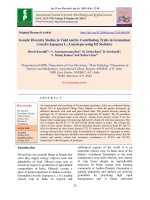
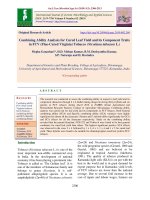
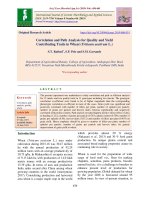


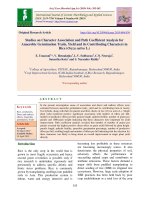
![Correlation and path coefficient analysis of fruits yield and yield attributes in okra [Abelmoschus esculentus (L.) Moench]](https://media.store123doc.com/images/document/2020_01/14/medium_ckb1578982226.jpg)
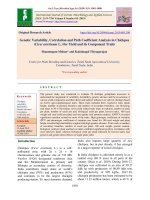
![Heterosis studies for earliness and yield related traits in sponge gourd [Luffa cylindrica (Roem.) L.]](https://media.store123doc.com/images/document/2020_03/02/medium_gca1583124685.jpg)
![Studies on combining ability for yield and its component traits in rabi sorghum [Sorghum bicolor (L.) Moench]](https://media.store123doc.com/images/document/2020_03/02/medium_mzw1583124925.jpg)